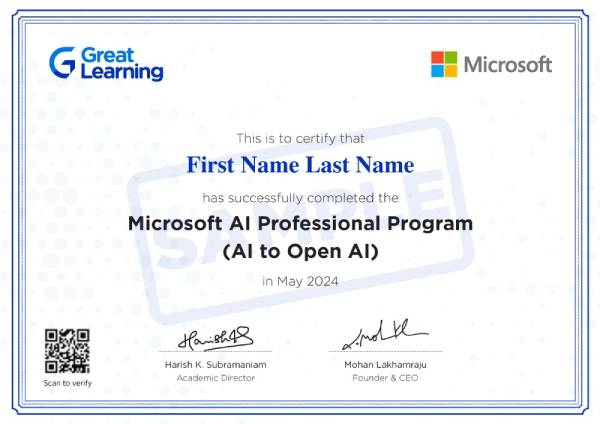Get the program brochure
Check out the program and fee details in our brochure

Microsoft AI Professional Program (AI to OpenAI)
Learn Microsoft AI Professional Program
Application closes 1st Jul 2024
- Program Overview
- Curriculum
- Certificate
- Key Outcomes
- Faculty
- Fees
Key Highlights of the Microsoft AI Professional Program
-

Industry-relevant curriculum by Microsoft Subject Matter Experts (SMEs)
-

15+ Live Mentorship Sessions with Industry Experts
-

Access to Azure Lab for Practice
-

Exam Preparation Material for DP-100
-

Prepare for Microsoft Applied Skills Badge (Train and manage a ML model on Azure ML)
-

Certificate from Microsoft and Great Learning
Skills You will learn
- Data Management
- Python Programming
- Training ML & DL Models
- Deploying Models
- Azure Blob Storage
- Azure SQL
- Azure ML Studio
- Azure Functions
- MLFlow
- Azure OpenAI Studio & API
- LangChain
Curriculum
In this 4-month beginner-friendly AI program, you will learn to develop an end-to-end AI solution for a business problem using Azure. Starting with the basics of data, you'll progress to building Machine Learning and Deep Learning models, applying Generative AI for text-based problems, and ultimately deploying and monitoring these models in a production environment.
Read more
Course-01: Pre-work
This course is focused on teaching you the absolute basics of data science, machine learning, and deep learning - and giving you a big picture view of how Azure Cloud Services can be used to build data-driven solutions
Week-01: Introduction to AI and the AI Value Chain
In the week, you will dive into the world of Artificial Intelligence by straightening out definitions such as AI, ML, DL, RL, LLM to fully comprehend the scope of this program, acquaint yourself with an extensive array of problems that can be solved using ML/DL algorithms and frameworks, and how an end to end AI workflow functions
Topics Covered:
- Practical Applications and Use-Cases of AI, ML, DL, RL, and LLMs
- Frameworks: TensorFlow, PyTorch, and Keras for implementing ML/DL models
- Concept of Evaluation Metrics: Accuracy, Precision, Recall, F1-Score, AUROC
- Interpreting Evaluation Metrics for ML models
- AI Life Cycle and stages
Course-02: Data Foundations on Azure
This course is focused on the essentials of working with data and solving problems with SQL and Python to build basics Analytics and Reporting workflows - get setup with the cloud platform and it's services, and get an understanding of how an end to end ML/AI solution looks like
Week-02: Fundamentals of SQL
In the week, you will learn to create and configure a data storage resource on the cloud, grasp how to manage data in a resource, including appending, modifying, deleting, securing, uploading, downloading, renaming, and organizing it into folders, and gain the ability to query data for answering basic business queries effectively
Topics Covered:
- Overview of Database Management Systems
- Introduction to SQL and its role in data management
- Introduction to DML and DQL in SQL
- Aggregating and Organizing Data in SQL
- Overview of common in-built functions
Week-03: SQL for AI Engineering
In the week, you will learn how to write complex queries for a deeper understanding of data and answering business questions, run quality checks on data through documentation of data profile and conducting business sense checks, and integrate diverse datasets to transform and prepare data for training
Topics Covered:
- Joins - Inner Join, Left join, right Join and full Join
- Subqueries - Scalar, Row and Table Subqueries
- Set operations - Union, Intersect and Except
- Window Functions
- Custom Functions and Views
Week-04: Python Programming Fundamentals
In the week, you will learn the syntax and semantics of Python including variables, data types, operators, expressions, and statements, harness your skills in functional programming using conditional statements, loops, exceptions, and functions, and acquaint yourself with the various types of compute instances, their pricing, and their usage areas
Topics Covered:
- Python Variables, Data Types, and Basic Operators
- Functional Programming with Conditional Statements, Loops and Lambda
- Python Data Structures: Lists, Tuples, Sets, and Dictionaries
- Overview Object-Oriented Programming in Python and use-cases
- Exploring Python Libraries and Modules for ML/AI
Week-05: Exploratory Data Analysis on Python
In this week, you will develop the ability to extract insights and identify patterns in data using statistics, execute correlation tests to ascertain associations among data sets, and cultivate the skill of coherently presenting insights and recommendations to stakeholders
Topics Covered:
- Implementing Descriptive Statistics for Univariate Analysis
- Perform Pearson, Spearman, and Kendall Correlation Tests
- Exploring Python's Matplotlib and Seaborn for Data Visualization
- Best Practices for Effective Visual Storytelling and Presenting Recommendations
- Dimensionality Reduction Techniques: PCA and t-SNE Using Scikit-Learn
Week-06: Intelligent Reporting on Azure
In the week, you will acquire the ability to assemble a simple yet effective analytics and reporting workflow, automate report generation, alerts, notifications, and dashboard updates using cloud-based tools, and design a straightforward yet functional data dashboard
Topics Covered:
- Understanding Business Analytics and Reporting Process
- Azure Alerting and Notification Services
- Creating Interactive Dashboards with Azure Power BI
- Integration of Diverse Data Sources
- Optimizing Reporting Performance and Troubleshooting
Week-07: Project-1
Sample Problem Statement:
E-comX, an e-commerce firm, is struggling with scattered, unstructured data hampering quick, data-driven decisions. The company requires an Azure-based solution for efficient data storage, with capabilities for complex queries, quality checks, and data integration for training purposes. Leveraging Python and compute resources, the solution should enable pattern recognition, correlation tests, and report automation. Ultimately, a simple, functional dashboard is sought for transforming raw data into accessible business insights to Key Stakeholders for faster, accurate decision-making.
Week-08: Learning Break
In the week, you will receive a refresher course on Machine Learning and Deep Learning to strengthen your fundamentals and concurrently, this period will serve as a buffer time for those who might need additional time to finalize your projects
Course-03: AI and ML on Azure
This course is focused on learning how to train and use different AI and ML algorithms / models to solve problems across the modalities of tabular, text and image data with Decision Trees, Neural Networks, and Large Language Models
Week-09: Machine Learning for Structured Data
In the week, you will master the skill of pre-processing, training, tuning, and evaluating models for Classification and Regression, learn the systematic procedure of hyper-parameter tuning and experimentation, and comprehend the type of resources and associated costs required for training ML models
Topics Covered:
- Data Preprocessing for Structured Data
- Model training and how it works for Classification and Regression Models
- Hyper-parameter Tuning
- Model Performance Evaluation
- Costs associated with Training
Week-10: Deep Learning for Computer Vision
In the week, you will carry out pre-processing, training, and evaluating Convolutional Neural Networks (CNNs), learn how to methodically experiment with model parameters, and also understand the type of resources necessary and costs implicated in training Deep Learning models
Topics Covered:
- Neural Networks Architecture
- Data Preprocessing for Image Data
- Training and Tuning Neural Networks
- Model Performance Evaluation
- Costs associated with Training Deep Learning Models
Week-11: Generative AI with Azure OpenAI
In the week, you will get set up with Azure OpenAI Studio, acquire the ability to write effective prompts for unique business use-cases, and gain an understanding of how different parameters work and influence the Language Model's responses
Topics Covered:
- Large Language Models - An Introduction
- How LLMs work - architecture and processes.
- Prompt Engineering Fundamentals
- Parameters and Pricing
- Applying PE for point business use-cases
Week-12: Prompt Engineering on Cloud
In the week, you will master using the Azure OpenAI API to administer prompts on data at scale, be adept at evaluating prompts and responses, and learn to apply various prompt techniques such as Zero-shot, Few-shot, and CoT
Topics Covered:
- Azure OpenAI API - and how to get setup with it on Python
- Prompting Techniques: Zero-shot, Few-shot and CoT
- Evaluating Prompts
- Evaluating LLM Results
- Automating LLM Functions on datasets
Week-13: Generative AI for NLP Solutions
In the week, you'll tackle text-based problems like Summarization and Classification, learn to implement Retrieval Augmented Generation (RAG) for Question Answering, and deploy a user-friendly chatbot to cater to a specific use-case
Topics Covered:
- Hugging Face - how to get setup - and how to use it?
- Summarization & Classification and their Evaluation metrics
- What are embeddings and embedding similarity measures - Cosine and Euclidean
- Vector Databases and how they are useful to implement RAG
- Deploying a chat-bot on Azure using App Services
Week-14: Project-2
Sample Problem Statement:
ABC Corporation is facing challenges with their customer service. They are struggling due to the inability to process queries in real time. They need a solution which can help them in text-based problem solving, scaling up their data processing, systematically experimenting with Language Models and having an efficient customer interaction through the deployment of a user-friendly chatbot on Azure Cloud, specifically leveraging Azure OpenAI capabilities. This will not only boost their data analytics performance but also enhance customer experience and response time.
Week-15: Learning Break
In the week, you are expected to pre-read the documentation on how to evaluate and consider costs associated with cloud solutions, as well as gain an overarching view of what an end-to-end Machine Learning Operations (MLOps) solution architecture entails
Course-04: MLOps on Azure
This course is focused on Ops - running jobs, deployment, monitoring and putting a fully functional pipeline together using pipelines, and managing that solution using DevOps and CICD principles
Week-16: Introduction to DevOps & MLOps
In the week, you will acquire a basic understanding of version control and its implementation, learn how to effectively set up and utilize Development and Production environments, and learn to operate a simple pipeline while understanding its overall architecture
Topics Covered:
- Understanding and Implementing Version Control with Git
- Effective Setup and Use of Development & Production Environments
- Running a Simple Pipeline and Understanding its Architecture
- Implementing CICD on Azure
- Managing Projects and Tracking in Azure DevOps
Week-17: Deploying and Monitoring an ML Workflow
In the week, you will acquire a basic understanding of version control and its implementation, learn how to effectively set up and utilize Development and Production environments, and learn to operate a simple pipeline while understanding its overall architecture
Topics Covered:
- Understanding and Implementing Version Control with Git
- Effective Setup and Use of Development & Production Environments
- Running a Simple Pipeline and Understanding its Architecture
- Implementing CICD on Azure
- Managing Projects and Tracking in Azure DevOps
Week-18: Project-3
Sample Problem Statement:
As Y-Movies continues to expand its data-driven strategies, they are confronted with the challenge of effectively managing machine learning models, from development to deployment. They are experiencing difficulties in automating tasks, maintaining versions, deploying models, and monitoring their performance. This manual and labor-intensive process has been sub-optimal, raising concerns about data quality, potential biases, and our team's capability to focus on strategic insights rather than operational tasks. Therefore, the business problem is to streamline, automate, and enhance our machine learning operations through Azure Cloud to enable efficient model management, robust model monitoring and retraining, and the creation of reliable customer-facing applications. This will eventually improve our decision-making, agility, and overall service of our streaming platform.
Industry Webinar
Building Data Products - A webinar by an Industry Expert who will give their perspective on how data products are built and integrated today into the products and services we use, and what lies ahead in your learning journey!
Earn a Certificate from Microsoft and Great Learning
Showcase your AI expertise with a certificate program from Microsoft and Great Learning

* Image for illustration only. Certificate subject to change.
Key Learning Outcomes
Build an End-to-end AI Solution for a Business Problem
-
Explore the capabilities of AI/ML/DL models and frameworks
-
Understand the approach and architecture of building data-driven solution
-
Build hands-on SQL, database management, and Python programming skills
-
Schedule and run Azure cloud jobs for training, tuning, and deployment.
-
Use Gen AI models to solve complex text-based problems.
-
Integrate ML lifecycle stages into pipelines with ML Ops and CI/CD
Meet Your Faculty and Mentors
Learn from highly skilled professionals who have engineered AI solutions across various industry verticals and possess extensive real-world, hands-on experience
Program Fee
Program Fees: 2,490 USD
Benefits of learning AI with us
- 4-month Online Learning
- Curriculum by Microsoft Subject Matter Experts
- Personalized assistance with dedicated program manager
- Access to Azure Labs Services
- 3 Industry Projects + 1 Industry Webinar
- Prepare for DP-100 exam and Microsoft Applied Skills Badge
Batch Start Date
-
Online · To be announced
Admissions Open


Microsoft AI Professional Program (AI to OpenAI)
Still have queries?
Contact Us
Download Brochure
Check out the program and fee details in our brochure
We are allocating a suitable domain expert to help you out with your queries. Expect to receive a call in the next 4 hours.
















